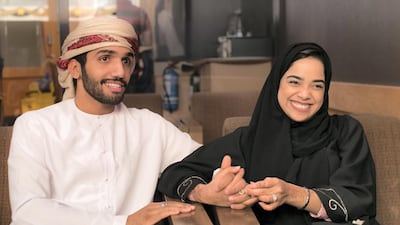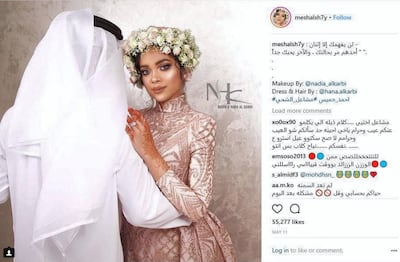Ahmed Khamis did not have a traditional upbringing, having been orphaned at birth. Neither did his wife Mashael Jamal, born to an Emirati father and Filipina mother.
And so the untraditional wedding of the popular Arabic-language television presenters featured the couple laughing and dancing together, feeding one another cake and with Mashael, 21, unveiled and wearing a fitted dress.
But when a video of the event on May 10 in Fujairah went viral, they received thousands of messages, many angry at that the couple were 'disrespecting' Emirati culture.
Police even intervened to advise the pair about their behaviour. And since then guests have even cancelled appearances on the Ramadan talk show that Ahmad, 24, - who shot to fame as the first Emirati on the talent show Arab Casting - currently hosts.
In an interview with The National, the couple spoke of the impact of the video leak, and how they have been treated since.
“I was so happy during the party. This was my day,” says Mashael. The couple’s happiness is evident with scenes showing Ahmed lifting up his wife in the air. They were legally married a few weeks earlier, as is common.
“An hour after I arrived back to the hotel room after the party. I checked my phone and saw that a video of the party was trending and all over social media,” she says.
The series of video clips were viewed more than a million times and the hate messages started pouring in.
These included: “'This is against our culture'. 'This couple does not represent us Emiratis'. 'They don’t deserve to be called Emirati'”.
“Police called us in the next day to give us advice and ask if we needed any assistance,” says Ahmed. Other comments urged the couple to enjoy their life as they wished.
But Ahmed is all the more taken aback by the fact he has become a voice for those without a traditional upbringing - particularly orphans.
His handsome, smiling face on television - he and his wife have co-presented shows on the hugely popular children's TV network Majid - has shown other orphans that anything is possible.
Children raised in orphanages, as Ahmad was in an Abu Dhabi institution, tend to marry other orphans raised in the same “house”.
Rarely do they marry women from prominent families.
They are given Emirati passports but many parents are reluctant to see their daughters marry young men with no surname or family lineage, in a society that prides itself on strong Arabic heritage.
Ahmed considers himself fortunate that the family of Mashael accepted his proposal.
Not only did they accept his proposal, but Mashael’s father asked for a dowry of half a dirham. High dowries exceeding Dh1 million are not uncommon, though the government has repeatedly encouraged Emiratis to not exceed Dh20,000 and spend less on wedding ceremonies to avoid debt.
“After Ahmed proposed, my father called me up and told me that he wasn’t going to ask for a dowry or a lavish wedding for me because he could see the kindness in Ahmed’s heart," says Mashael with a wide smile.
Ahmed says: “I can’t describe to you how happy I felt at the time.
“I was finally going to have a family after being raised in an orphanage my whole life and going through dozens of “mothers”.
“Mama Hashemia, Mama Minteet, Mama Marry, he says" counting the number of 'mothers' - or nannies - that he had at the orphanage.
“I think around five or six,” he says. “Mostly Filipinas."
"So when I found out that Mashael’s mother was from the Philippines, I felt warm inside, like it was fate,” he said. When Mashael speaks Tagalog, Ahmed swoons with excitement.
“A few more words, please,” he says.
Despite the fallout from the wedding video and the potential impact on their careers, the episode has placed the spotlight on orphans like Ahmed.
Ask an Abu Dhabi orphan who their parents are and they will reply 'Sheikha Fatima and Sheikh Zayed', who ensured an education, upbringing, citizenship and financial support was in place for all.
They are given financial support of Dh5,000 per month and all their basic needs and education are taken care of until they secure employment.
Ahmed has also spoken on a talk show to tell how he was beaten up as a child and had lived a difficult childhood.
“My point was that these struggles made me who I am today. They toughened me up and look at how I turned out to be. It isn’t the end of the world if you have no family or parents. Yes it is something that I will never overcome but I found love, I found my soulmate,” he says.
“Some say that I was left at the hospital and others say that I was found in a trash can. I spent my childhood ashamed and shy and wondering why and how could my parents abandoned me, who and where are they,” he says.
“These things today don’t matter to me anymore. I never meant to insult anyone, all I wanted to show was that there is life for us beyond the orphanage and the label of 'an orphan'. We are like everybody else,” he says.
______________
Read more:
Abu Dhabi newlywed bikers ride off into the sunset
Can my father consent to my marriage via email?
Plan the ultimate luxury wedding in the UAE
______________
The couple say they deeply regret the spread of the video, and stress they meant no offence to anyone, but feel let down at their treatment. They also now plan to marry in the Philippines.
“It was a private affair and should not have gone out, but how do we claim tolerance when we send out so many hate message and insult people? That to me goes against our culture and traditions,” says Mashael.


